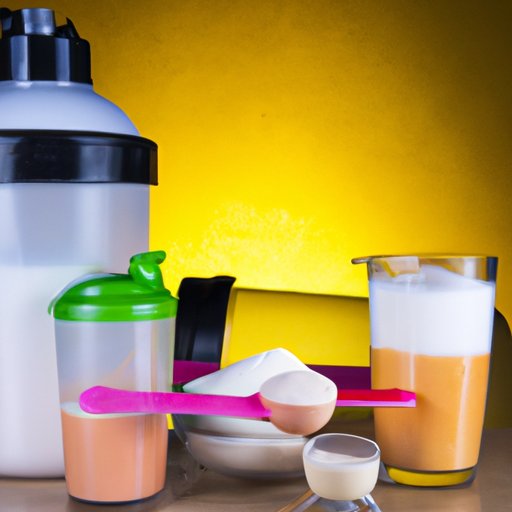
I. Introduction
Are you looking to lose weight quickly and efficiently? If so, you need to know the role of protein in your diet. While cutting calories can lead to short-term weight loss, incorporating sufficient protein into your diet can help you maintain weight loss over the long term. This article will delve into everything you need to know about the right amount of protein for weight loss.
II. What Science Says About Protein Intake for Weight Loss
Recent scientific research shows that incorporating protein into your diet helps reduce hunger levels, leading to a decrease in calorie intake at subsequent meals. A study from the University of Missouri found that high-protein breakfasts can reduce post-meal cravings and hunger, making it easier to maintain a caloric deficit and lose weight over the long term.
However, to achieve these benefits, it’s essential to have the right protein intake to complement your weight loss goals.
III. The Role of Protein in Weight Loss and Muscle Building
When our bodies are in calorie deficit, on a weight-loss journey; we not just lose fat mass, but also muscle mass. However, if we keep our protein intake high, our body burns fat as its energy source instead of our muscles. In other words, protein helps preserve muscle mass during weight loss and promotes fat burning, leading to faster weight loss. Furthermore, high-protein diets can also help the body burn more calories during exercise, leading to even more weight loss.
IV. How to Calculate Your Optimal Protein Intake for Weight Loss
Your protein needs vary based on factors such as body weight, activity level, and age. As a general guideline, aim to consume between 0.8 to 1 gram of protein per pound of body weight per day. For example, if you weigh 150 pounds, aim to consume between 120 and 150 grams of protein per day. It’s worth noting that athletes or active individuals should consume more protein to help maintain and repair muscle tissue.
To make things more straightforward, you can use various online software and mobile apps to calculate your recommended daily protein intake accurately.
V. The Best Protein Sources for a High-Protein Weight Loss Diet
Some of the best protein-rich foods for weight loss include chicken, turkey, fish, tofu, legumes, nuts, seeds, eggs, and dairy products such as milk, cheese, and yogurt. Incorporating these foods into your meals and snacks throughout the day will help you reach your daily protein intake needs.
VI. Protein Shakes: Are They Effective for Weight Loss?
Protein shakes are an easy and convenient way to boost your daily protein intake and reduce caloric intake. Various commercial products come nowadays low in calories and provide essential vitamins and nutrients when mixed with water or milk. However, it’s always best to consume whole foods to meet your daily protein intake goals since high-sugar protein shakes can lead to weight gain, undoing any progress you’ve made in your weight loss journey.
VII. The Importance of Spreading Out Protein Intake Throughout the Day for Weight Loss
Spreading out your protein intake throughout the day can help maintain muscle mass and promote satiety, protecting against weight gain. Ideally, including protein with each meal and snack can help you to achieve your daily protein intake while keeping you full and on top of your weight control requirements.
VIII. Myth Busting: Do You Really Need a High Protein Diet for Weight Loss?
There’s a common myth that high protein intake leads to kidney or liver damage. However, that’s not necessarily the case. Recent scientific research states that, especially for those working out, high protein intake is safe in moderation and leads to a better preservation of muscle mass.
IX. Conclusion
If you’re curious about how much protein a day you need for weight loss, the above content will help you determine your protein intake goals and provide you with the best protein sources for a high-protein weight loss diet. Regular monitoring of your protein intake goals and its importance during your weight loss journey will help you achieve your weight loss goals healthily.





